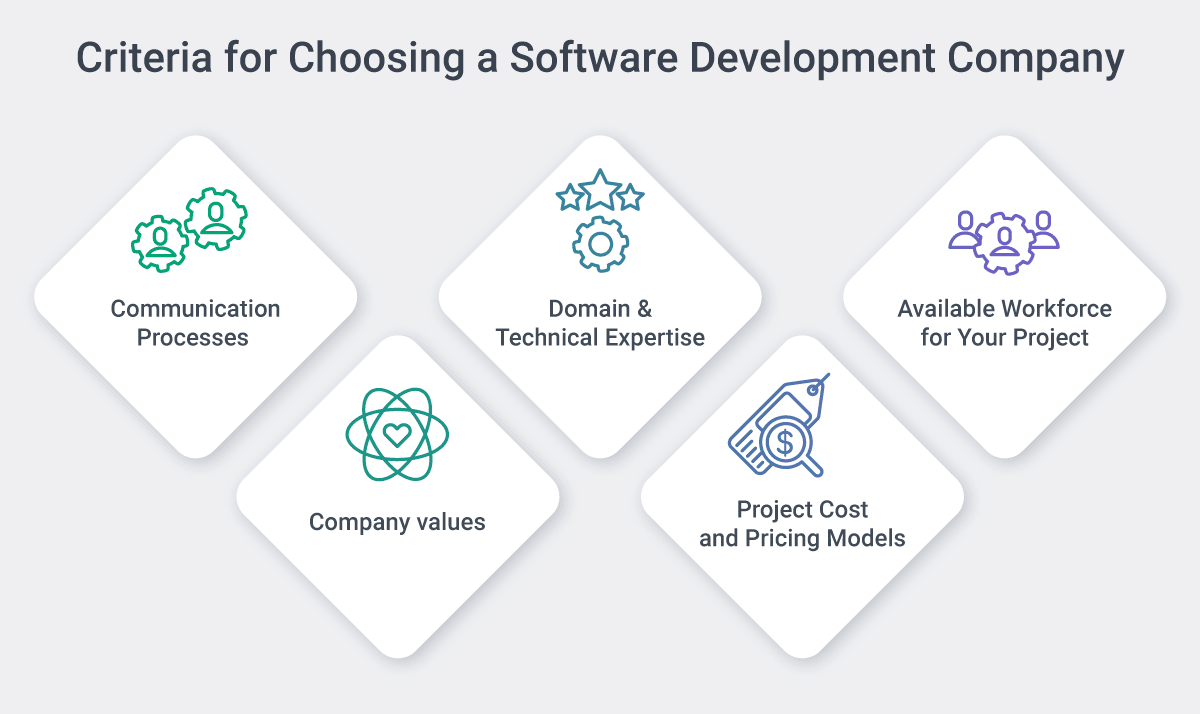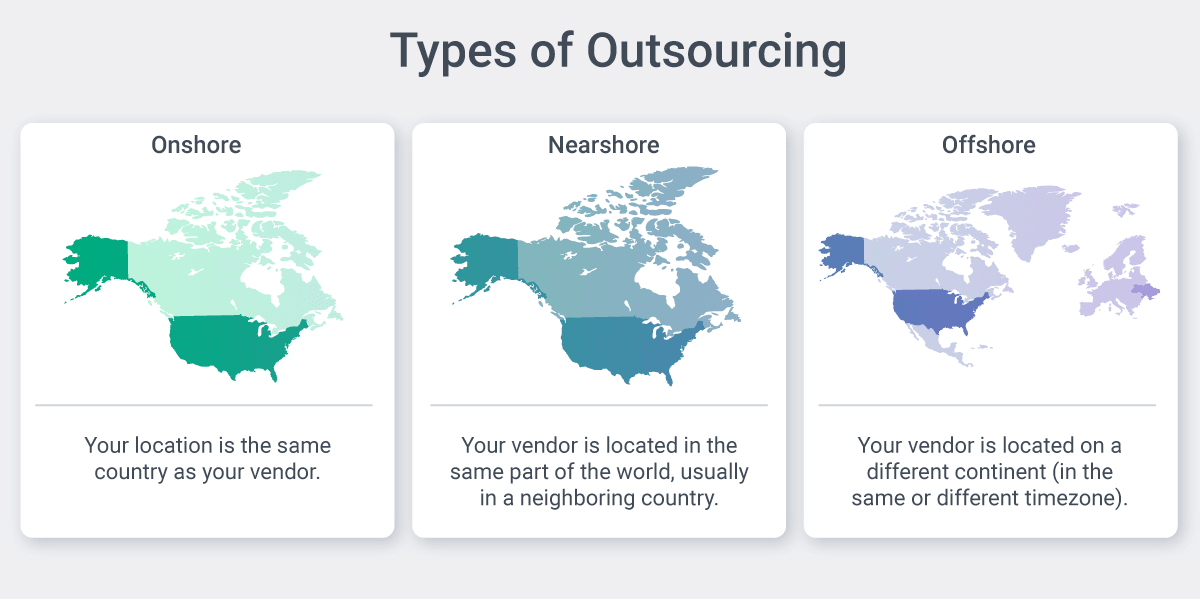Working with software development companies is not just a way for companies to reduce costs, it can also be a powerful driver of innovation and growth. In fact, according to IBM, 27% of companies use software development services for cost-cutting purposes. In contrast, the majority of companies turn to outside developers to enhance innovation, optimize their business operations, and speed up development.
Both small and large businesses can benefit from the expertise and fresh perspectives of a different development team. It may come as a surprise, but some of the world's most successful companies, such as Google, Apple, and Skype, have partnered or continue to partner with software development providers as part of their development. According to Statista, 92% of the top 2,000 public companies in the world utilize IT partnerships.
Overall, the software development industry is projected to grow in the coming years massively. Global spending on software development partnerships will reach $587 billion by 2027, increasing yearly by 8.2%.
With hundreds of thousands of IT service providers on the global market, people often think that it must be easy to pick one simply. The ‘paradox of choice’ suggests that an abundance of options actually requires more effort to choose.
Since you are trusting the future of your business and its development to an external company, this is not a decision to make lightly. To find a trustworthy partner with the right expertise, you will have to spend some time researching preparing, and engaging with potential companies.

Understanding Your Project Needs: The Cornerstone of Successful Software Development
In the high-stakes world of modern software development, clarity is king. Before engaging with any development company, you must have a crystal-clear understanding of your project's scope and specific requirements. This clarity isn't just a nicety; it's the bedrock upon which successful collaborations are built, ensuring that the final product aligns seamlessly with your business objectives.
Defining Your Project Scope and Requirements
The importance of a clear vision cannot be overstated. A well-defined project acts as a north star, guiding your development team and drastically reducing the risk of costly misunderstandings. It keeps all stakeholders aligned on desired outcomes, from the C-suite to the development trenches.
To effectively document your requirements, consider these industry-proven strategies:
Leverage the Power of a Software Requirements Specification (SRS) Document
An SRS document is your project's bible. It provides a comprehensive framework that details every aspect of your project, covering functional requirements, system behaviors, performance metrics, and user interactions. The benefits of using an SRS are manifold:
- It ensures all stakeholders have a unified understanding of the project scope.
- It is a constant reference point throughout the development process, minimizing ambiguities.
- Use it if your development partner offers an SRS template (as Softjourn does). These templates are designed to capture all necessary information efficiently, saving you valuable time and ensuring completeness.
Don't skimp on the details when outlining features and functionalities. The more specific you are, the easier developers can translate your vision into reality. Remember:
- Specify all features, functionalities, and user interactions you expect from the software.
- Leverage visual aids. Diagrams, flowcharts, and mockups can convey complex ideas more effectively than text alone, providing a universal language that minimizes misinterpretation.
Prioritize Features Strategically
Not all features are created equal. Identify which components are critical for the initial launch and which can be scheduled for later updates. This approach:
- Helps manage timelines and budgets effectively.
- Ensures that prioritized features directly contribute to your strategic objectives, providing maximum value early in the development cycle.
Setting Clear Goals and Deliverables
With your scope defined, it's time to establish specific goals and deliverables. This step is crucial for measuring success and keeping your project on track.
Break down your project into smaller, manageable phases. This approach allows for easier progress monitoring and prompt issue addressing. When setting timeframes:
- Assign deadlines to each milestone to maintain steady progress.
- Be realistic about what can be achieved within each timeframe to avoid unnecessary pressure and team burnout.
Leverage Key Performance Indicators (KPIs)
Well-defined KPIs are your project's vital signs. They should align closely with your business objectives and might include metrics such as:
- Development speed
- Code quality
- User engagement
- Return on investment
Regularly reviewing these KPIs allows for informed decision-making about necessary project scope or strategy changes.
Before selecting a development partner, consider getting a baseline assessment of your current technical state. Our startup audit services provide an objective evaluation that helps you communicate requirements more effectively to potential partners.
Deciding on the Technology Stack
Your choice of technology stack can make or break your software's performance, scalability, and future maintenance. Consider these factors:
- Alignment with Existing Systems
If you have existing software or systems, select compatible technologies. This approach:
- Reduces integration issues
- Leverages your current infrastructure
- Maintains consistency across projects, simplifying training, development processes, and support
- Starting from Scratch
If you're building from the ground up:
- Evaluate maintainability: Choose technologies known for stability and long-term support.
- Assess popularity and community support: Popular technologies often come with large communities, extensive documentation, and frequent updates.
- Consider the availability of specialists: Widely-used technologies increase your talent pool.
- Plan for future growth: Opt for technologies that can scale with your business.
Consult with Experts
When in doubt, leverage external expertise. A reputable software development company can provide invaluable insights into which technologies best suit your project needs and business goals. They can also keep you informed on industry trends, helping you make decisions that are future-proof and aligned with current best practices.
By taking the time to understand and document your project needs thoroughly, you're not just preparing for development – you're laying the groundwork for success. This comprehensive approach enables effective communication with potential development partners and ensures that the delivered software aligns perfectly with your strategic goals. Remember, in modern software development, preparation isn't just half the battle – it's the key to victory.

Researching Potential Companies: Navigating the Software Development Landscape
Finding the right software development company is a critical step that requires careful research and analysis. Breaking down this process into smaller, manageable tasks can help you make an informed decision.
In the vast ocean of software development companies, finding the right partner for your project can seem like searching for a needle in a haystack. However, with a structured approach and the right tools at your disposal, you can efficiently identify and evaluate potential partners that align with your project needs and company values. Let's dive into the strategies that will help you navigate this complex landscape.
Identifying Potential Companies
In today's digital age, your search for the ideal software development partner often begins online. Here's how to make the most of various online resources:
Search Engines: Your First Port of Call
Utilize search engines like Google with specific, targeted keywords related to your project needs. For instance, searching for "mobile app development services for fintech", "legacy system modernization" or "custom event ticketing solutions" can yield a list of specialized companies.
Pro tip: Don't just stick to the first page of results; sometimes, hidden gems lie a few pages deep.
Professional Networking Sites: Tapping into Industry Connections
- LinkedIn: This platform is a goldmine for finding and vetting software development companies. Use filters to narrow down your search by industry, location, and company size. Engage with your network for recommendations and insights.
- GitHub and Stack Overflow: These platforms offer a unique glimpse into a company's technical prowess. Examine their contributions to open-source projects and problem-solving abilities in real-world scenarios.
Review and Rating Websites: The Power of Peer Reviews
Clutch.co and GoodFirms: These platforms provide verified reviews and ratings of software development firms worldwide. Pay close attention to detailed reviews that discuss project specifics, challenges faced, and outcomes achieved.
Freelance Marketplaces: A Mixed Bag of Opportunities
While platforms like Upwork and Freelancer primarily cater to individual freelancers, some agencies also list their services here. Approach these options with caution and conduct thorough due diligence before engagement.
Why This Matters: This multi-pronged approach to online research casts a wide net, increasing your chances of finding companies that perfectly match your needs. It also allows you to filter based on specific criteria and gain insights into a company's reputation and technical capabilities before initial contact.
Industry Events and Conferences: The Power of Face-to-Face Networking
While online research is crucial, don't underestimate the value of in-person interactions at industry events and conferences. Here's why they're worth your time:
Tech Conferences: A Hub of Innovation
Tech events like Web Summit, CES, or TechCrunch Disrupt are hotbeds of technological innovation. As well as the industry-specific ones like INTIX, Ticketing Business Forum, etc. They offer unparalleled opportunities to:
- Meet representatives from software development companies face-to-face
- Attend workshops and seminars focused on the latest software development trends and challenges
- Engage in meaningful conversations about your project needs
Networking Opportunities: Building Valuable Connections
These events facilitate relationship-building with industry professionals, leading to referrals and recommendations and expanding your pool of potential partners.
Why This Matters: Face-to-face interactions provide a depth of understanding about a company's capabilities and culture that's hard to glean from online research alone, moreover, these events showcase cutting-edge technologies and methodologies, helping you identify companies at the forefront of innovation.
Referrals and Recommendations: The Trust Factor
Never underestimate the power of your professional network when seeking a software development partner. Here's how to leverage it effectively:
Tap into Your Professional Networks
- Reach out to colleagues and peers with experience with outsourcing software development projects.
- Utilize connections from chambers of commerce or industry-specific associations.
Analyze Client Testimonials and Case Studies
Review case studies provided by companies to gain insights into client feedback and project outcomes. Look for detailed accounts of challenges faced and solutions implemented.
Why This Matters: Referrals and recommendations from trusted sources are more important than anonymous online reviews. They provide a window into a company's track record of successful projects and can significantly reduce the uncertainty associated with outsourcing.
Local vs. Offshore Companies: Weighing Your Options
The decision between local and offshore development partners is crucial and depends on various factors. Let's break down the pros and cons:
Local Companies:
Advantages:
- Cultural alignment facilitates smoother collaboration
- Ease of communication due to shared time zones and language
- Opportunities for face-to-face meetings enhance trust and understanding
Disadvantages:
- Higher costs due to local market conditions
- Potentially limited talent pool for specialized skills
Advantages:
- Cost efficiency due to lower operational costs in other countries
- Access to a broader range of expertise and specialized skills
- Potential for around-the-clock work due to time zone differences
Disadvantages:
- Communication challenges due to language barriers and time zone differences
- Cultural differences may require adjustments in business practices and work ethics.
Why This Matters: Understanding the trade-offs between local and offshore options helps you align your choice with your project's specific needs regarding cost, expertise, and collaboration style. It also allows you to plan for potential challenges and optimize your resources effectively and proactively.

Evaluating Company Expertise
Once you've identified potential partners, the next crucial step is to evaluate their expertise thoroughly. This process involves:
- Assessing Technical Proficiency:
- Ensure alignment with your technology stack needs
- Look for versatility in multiple technologies
- Verify industry-standard certifications (e.g., ISO 9001, CMMI)
- Reviewing Portfolios:
- Examine projects similar to yours in scope or industry
- Evaluate the quality of user experience and performance in their delivered products
- Analyzing Case Studies:
- Understand their problem-solving approach and methodologies
- Look for quantifiable results and positive impact on client businesses
Why This Matters: This evaluation process ensures that your chosen partner can handle your project's technical requirements, a track record of delivering quality work, and a proven ability to solve complex problems in real-world scenarios.
Verifying Reputation and Reliability
A company's reputation and reliability are as crucial as its technical skills. Here's how to verify them:
- Read reviews and testimonials: Prioritize reviews from independent third-party sites. Look for detailed feedback and recurring themes in reviews.
- Contact past clients: Request and follow up on references. Prepare specific questions about project management, communication, and overall satisfaction.
- Check company background: Consider the company's years in business and financial stability. Verify legal compliance and relevant certifications.
Why This Matters: This thorough vetting process helps you avoid unreliable partners, confirms a company's strengths, and provides insights into what it's really like to work with them.
Evaluating Communication and Cultural Fit
Effective communication and cultural compatibility are often the unsung heroes of successful outsourcing partnerships. Key areas to assess include:
- Language proficiency: Evaluate clarity in both verbal and written communication
- Work culture compatibility: Assess alignment in project management styles and business practices. Gauge their commitment to professionalism and ethical conduct.
- Time zone considerations: Identify overlapping working hours for real-time communication. Set clear expectations for response times.
- Designating points of contact: Having a single point of contact (SPOC) on both sides can streamline communication and accountability. This approach centralizes information flow and reduces the risk of miscommunication. A designated project coordinator is the primary liaison between the in-house team and the development partner. This SPOC was responsible for consolidating feedback, clarifying requirements, and ensuring consistent communication flow. As a result, misunderstandings are significantly reduced, and decision-making processes are accelerated.
- Establishing clear communication channels: Utilize email for formal communication and documentation. Use instant messaging for quick exchanges and real-time problem-solving. Video conferencing enhances understanding and builds rapport.

Why This Matters: A good fit in these areas can significantly enhance collaboration efficiency, contribute to project success, and pave the way for long-term partnerships.
Understanding the Advantages of Outsourcing
As you embark on this journey, it's crucial to keep in mind the key benefits of outsourcing:
- Cost savings through lower operational costs
- Access to specialized skills on demand
- Ability to focus on core business activities
- Enhanced scalability and flexibility
Why This Matters: Recognizing these advantages helps you optimize resources, enhance project outcomes, and adapt more readily to changing project requirements.
Finding the right software development partner is undoubtedly complex, but it's a critical investment in your project's success. By methodically working through each step — from initial identification to in-depth evaluation of expertise, reputation, and cultural fit — you significantly increase your chances of forming a successful partnership.
Effective communication and collaboration are fundamental to the success of an outsourced software development project. You can build a strong partnership with your development team by proactively establishing clear communication channels, overcoming language and cultural barriers, and utilizing collaborative tools and practices. This not only enhances the efficiency and quality of the project but also fosters a positive working relationship that can benefit future collaborations.
Remember, the goal is not just to complete a project, but to create a synergistic partnership that drives innovation and growth for your business. With the right communication and collaboration strategies in place, your outsourced software development project has a much higher chance of success, delivering value far beyond the initial scope of work.
Assessing Technical Expertise: The Cornerstone of Successful Software Development
In the dynamic world of software development, technical expertise is not just an asset—it's a necessity. The technical prowess of your chosen development partner can be the difference between a project that soars and one that stumbles. This section will guide you through the intricate process of evaluating a potential partner's technical capabilities, ensuring they have the skills and knowledge to bring your vision to life.
When assessing a company's technical skills, it's crucial to look beyond generic claims of expertise. You need to ensure their capabilities align precisely with your project requirements and that they have the adaptability to stay current in a rapidly evolving field.
When assessing a company's technical skills, it's crucial to look beyond generic claims of expertise. You need to ensure their capabilities align precisely with your project requirements.
Technology Stack Alignment:
Scrutinize their portfolio for projects that utilize the specific programming languages, frameworks, and tools your project demands. Request detailed case studies that demonstrate their proficiency in these technologies.
Why This Matters:
- Ensures Capability: A perfect match between their skills and your needs significantly reduces the risk of technical shortcomings or delays.
- Reduces Onboarding Time: A team already versed in your required technologies can hit the ground running, accelerating your project timeline.
Adaptability to New Tech Trends: Staying Ahead of the Curve
In our rapidly evolving tech landscape, a company's ability to adapt to new trends is not only beneficial but essential for long-term success.
- Continuous Learning Culture: Inquire about their professional development programs. Do they encourage certifications? Attend conferences? Host internal knowledge-sharing sessions?
- Use of Modern Tools: Investigate their development environment. Are they using cutting-edge IDEs, version control systems, and DevOps implementation practices?
Why This Matters:
- Future-proofs Your Project: A forward-thinking team can incorporate the latest innovations, enhancing your software's longevity and competitiveness.
- Innovation Potential: Adaptable teams are better equipped to offer creative solutions and handle emerging challenges, keeping your project at the forefront of technology.
Certifications and Training: Validating Expertise
While not the sole indicator of skill, certifications and ongoing training programs demonstrate a commitment to excellence and up-to-date knowledge.
- Professional Certifications: Look for industry-recognized credentials relevant to your project, such as Microsoft Certified, AWS Certified, or language-specific certifications.
- Ongoing Training Programs: Inquire about their approach to continuous professional development. Do they have a structured program? How frequently do team members undergo training?
Why This Matters:
- Validate Expertise: Certifications provide external validation of a developer's skills, giving you added confidence in their capabilities.
- Quality Assurance: Ongoing training ensures the team stays abreast of the latest best practices and standards, contributing to higher-quality output.
Understanding Their Development Process: The Path to Your Product
How a company approaches software development can significantly impact your project's success. Understanding their methodologies, quality assurance practices, and project management tools is crucial to ensure they align with your expectations and needs.
Development Methodologies: Choosing the Right Approach
The company's development methodology can significantly impact your project's timeline, flexibility, and outcome. Understanding their approach is crucial for aligning expectations and workflows.
- Agile Methodology: Ideal for projects with evolving requirements, emphasizing flexibility and customer collaboration.
- Scrum Framework: A specific Agile approach that divides work into short sprints, promoting rapid delivery and adaptability.
- Waterfall Model: Suitable for projects with well-defined, stable requirements, following a linear, sequential approach.
Why This Matters:
- Alignment with Your Project: The proper methodology, tailored to your project's needs, ensures smoother collaboration and better outcomes.
- Impact on Timelines and Flexibility: Understanding their process helps you anticipate how changes will be handled and set realistic expectations for deliverables.
Quality Assurance Practices: Ensuring Excellence at Every Step
A robust QA process is not an afterthought—it's an integral part of delivering high-quality software that meets and exceeds expectations.
- Testing Procedures:
- Automated Testing: Inquire about their automated testing suite. What tools do they use? How comprehensive is their test coverage?
- Manual Testing: Understanding their approach to human-led testing is crucial for catching nuanced issues that automated tests might miss.
- Code Reviews:
- Ask about their code review process. Is it a standard practice? How do they ensure code quality and adherence to best practices?
Why This Matters:
- Ensures Product Quality: Rigorous QA practices significantly reduce bugs and enhance the reliability of your software.
- Saves Time and Costs: Early issue detection and resolution prevent costly fixes, saving both time and resources.
Project Management Tools: Enhancing Collaboration and Transparency
The right project management tools can improve collaboration, transparency, and overall project efficiency.
- Task Tracking: Investigate their use of tools like Jira, Trello, or Asana to monitor progress and manage tasks.
- Communication Platforms: Understand how they facilitate real-time communication. Do they use Slack, Microsoft Teams, or other collaboration tools?
Why This Matters:
- Transparency: Access to these tools allows you to monitor progress in real-time, keeping you informed and involved.
- Efficient Collaboration: Streamlined communication and task management improve productivity and reduce misunderstandings, keeping your project on track.
By thoroughly assessing a company's technical expertise across these areas, you're not just evaluating their current capabilities—you're gaining insight into how they can drive your project forward, adapt to challenges, and deliver a product that meets your immediate needs and positions you for future success. Remember, in the world of software development, technical expertise is not just about what a company knows today, but how they're prepared to evolve and innovate for tomorrow.
Industry-Specific Experience: Leveraging Domain Knowledge for Your Advantage
When selecting a software development partner, their familiarity with your industry can be a game-changer. A team that understands the nuances of your sector can provide insights and solutions that go beyond generic software development.
Familiarity with Your Industry
A development partner with experience in your industry brings more than just technical skills to the table. They bring a deep understanding of your sector's unique challenges and requirements.
- Domain Knowledge: Look for a team that understands industry-specific regulations and compliance requirements. This knowledge can be crucial in sectors like finance, healthcare, entertainment or government, where adherence to strict guidelines is non-negotiable.
- Insight into Industry Challenges: A partner familiar with your industry will be aware of common pain points and can offer solutions that effectively address these specific issues.
Why This Matters:
- Reduced Learning Curve: A company well-versed in your industry can hit the ground running, contributing value from day one without needing extensive onboarding about sector-specific needs.
- Better End Product: Industry-specific insights often lead to more relevant and effective software solutions tailored to address your sector's unique challenges.
Case Studies in Your Sector
Examining a company's track record in your industry provides concrete evidence of their capabilities and can offer valuable insights into how they might handle your project.
- Success Stories: Look for case studies where the company has solved problems similar to yours. These narratives can give you a clear picture of their problem-solving approach and the results they've achieved.
- Client Testimonials: Feedback from clients in your industry can provide reassurance about the company's ability to meet sector-specific needs and expectations.
Why This Matters:
- Demonstrates Expertise: A history of successful projects in your industry is a strong indicator of the company's ability to meet your specific requirements.
- Builds Confidence: Knowing they have delivered positive results for similar clients can boost your confidence in their competence and reliability.

Assessing Team Structure and Experience: The People Behind the Code
The backbone of any successful software project lies in the team that brings it to life. Understanding the composition and stability of a development team is paramount to ensuring project success.
The Importance of a Well-Structured Team
A well-structured team with clearly defined roles is the engine that drives efficient project execution. When evaluating potential partners, consider the following:
Roles and Responsibilities: Look for a company that offers a comprehensive team covering all aspects of your project needs. This should include:
- Skilled developers proficient in relevant programming languages
- User experience (UX) and user interface (UI) designers
- Quality assurance (QA) testers
- Experienced project managers
- Business analysts (if applicable)
Experience Levels: A balanced team with a mix of senior and junior staff offers the best of both worlds:
- Senior developers bring the depth of experience, industry insights, and complex problem-solving skills.
- Junior members offer fresh perspectives, enthusiasm, and cost-efficiency.
Why Team Structure Matters
Comprehensive Skill Set: A diverse team with various specializations can handle all aspects of your project effectively. This means:
- Front-end developers create intuitive user interfaces
- Back-end developers ensure robust functionality
- DevOps specialists maintain smooth deployment and operations
- QA testers rigorously check for bugs and usability issues
Efficient Workflow: Clear role definition prevents overlap and confusion, enhancing overall productivity. When each team member knows their responsibilities:
- Tasks are completed more quickly and accurately
- Communication flows smoothly between different departments
- Project milestones are met consistently
Employee Retention Rates: A Key Indicator of Stability
High employee retention is often a positive indicator of a company's work environment and its ability to deliver consistent results. When evaluating potential partners, don't hesitate to inquire about their retention rates.
Why Low Turnover Matters
Maintains Project Continuity: A stable team reduces the risk of knowledge loss and project delays that can occur when key team members leave mid-project. Benefits include:
- Consistent understanding of project goals and requirements
- Reduced onboarding time for new team members
- Smoother collaboration and communication
Reflects Company Culture: High retention rates often indicate a positive work environment, which can translate into:
- Better performance and motivation
- Higher quality work output
- Increased innovation and problem-solving capabilities
Evaluating Reliability and Trustworthiness: Building a Foundation of Trust
While technical expertise is crucial, the reliability and trustworthiness of your chosen partner are equally important for a successful collaboration. Let's explore key factors to consider when assessing a potential software development company's dependability.
Company Background and History: A Window into Stability
A company's history provides valuable insights into its stability, adaptability, and commitment to excellence. Consider the following aspects:
Years in Business: Longevity in the industry often correlates with stability and reliability. Companies with a substantial track record typically offer:
- Established processes refined over time
- A proven history of successful project delivery
- Financial stability to sustain long-term partnerships
Growth and Development: A company's growth trajectory can indicate its adaptability and market success. Look for:
- Expansion of services: This suggests the company is responsive to market needs and capable of innovation.
- Growing client base: An expanding clientele often signifies satisfaction with the company's work and positive word-of-mouth referrals.
Awards and Recognitions: Industry accolades serve as third-party validation of a company's expertise and commitment to quality. Consider:
- Certifications: ISO certifications, for example, indicate adherence to international quality standards.
- Awards: Recognition from reputable industry organizations can highlight excellence in specific areas.
Client References and Feedback: The Voice of Experience
Perhaps the most valuable insights come from those who have firsthand experience working with the company. Don't hesitate to:
- Request References: Ask for direct contact with past clients, particularly those with projects similar to yours in scope or industry.
- Prepare Questions for References: When speaking with references, focus on key areas such as:
- Project management capabilities
- Communication effectiveness
- Quality of the delivered product
- Analyze Testimonials and Case Studies: Look for detailed, outcome-focused testimonials and case studies. These should provide:
- Specific accounts of the project journey, including challenges faced and solutions implemented
- Tangible results and benefits achieved
Intellectual Property Rights and Dispute Resolution
Ensure that your partnership is built on a solid legal foundation:
Intellectual Property Rights: Contracts should clearly specify your ownership of all developed software and related materials.
Dispute Resolution Policies: Clear dispute resolution mechanisms provide a roadmap for addressing disagreements and reducing uncertainty and risk.

Transparency and Communication Practices: Fostering Trust
Open, honest communication is the bedrock of a successful partnership. Look for companies that prioritize transparency:
- Open Communication: Seek partners that provide:
- Regular, detailed progress reports
- Easy access to key team members for discussions
- Honesty in Commitments: Be wary of unrealistic promises. Companies that provide transparent pricing and feasible timelines demonstrate integrity and set the stage for a trusting relationship.
Ethical Standards and Corporate Social Responsibility: Aligning Values
A company's ethical practices and social responsibility initiatives can reflect its overall integrity and values alignment with your organization.
- Ethical Business Practices: Look for a clear code of conduct emphasizing integrity in all business dealings.
- Corporate Social Responsibility: Consider companies that commit to social and environmental causes.
By thoroughly evaluating these aspects of a software development company's expertise, team structure, reliability, and ethical standards, you can make an informed decision that aligns with your project needs and business goals. Remember, choosing the right partner is about balancing technical prowess and cultural fit – a combination that will drive your project to success.
Corporate Social Responsibility (CSR)
Companies engaged in environmental and social initiatives demonstrate a commitment to broader societal benefits. For example, Patagonia's commitment to environmental causes aligns with its brand values and appeals to environmentally conscious consumers.
In conclusion, evaluating the reliability, trustworthiness, and cost-effectiveness of a software development company is a multifaceted process that goes beyond assessing technical skills. By thoroughly examining a company's background, client feedback, financial stability, legal compliance, ethical standards, and pricing models, you can mitigate risks and choose a partner who will be dependable throughout your project and beyond. Remember, a trustworthy partner delivers quality work and enhances the overall success and integrity of your business endeavors.
Cost Considerations: Striking the Right Balance for Software Development Outsourcing
Understanding the financial aspects of outsourcing software development is crucial for making informed decisions that align with your budget and business objectives. This section will guide you through navigating pricing models, uncovering potential hidden costs, and finding the optimal balance between cost and quality.
Understanding Pricing Models: Choosing the Right Fit
Different pricing models suit different project types and organizational needs. Let's explore the main options:
Fixed-Price Contracts: Predictability in Budgeting
Fixed-price contracts are ideal when you have well-defined project requirements that are unlikely to change significantly.
- Definition: The total cost is agreed upon upfront for a clearly defined project scope and specifications.
- Advantages:
- Budget predictability: Knowing the total cost in advance aids in financial planning.
- Low risk for the client: The vendor bears the risk of cost overruns due to underestimations.
For example, a fixed-price contract would work well for developing a specific feature with clear requirements, such as implementing a standard e-commerce checkout process.
Time-and-Materials Contracts: Flexibility for Evolving Projects
This model is suitable when project scope is likely to evolve or is not fully defined at the outset.
- Definition: Costs are calculated based on the actual time spent and resources used during development.
- Advantages:
- Flexibility: Allows for changes and adjustments throughout the development process.
- Transparency: Provides detailed breakdowns of how time and resources are allocated.
This model is often used in ongoing product development scenarios where features may need to be adjusted based on user feedback and market trends, such as developing a social media platform with evolving user engagement features.
Dedicated Team Model: Long-Term Collaboration
This approach works well for long-term projects with evolving requirements.
- Definition: A team of developers is dedicated exclusively to your project and functions as an extension of your in-house team.
- Advantages:
- Consistent team: Maintains knowledge continuity and deepens understanding of your business.
- Scalability: Allows you to scale the team up or down based on project needs.
This model is particularly effective for long-term, complex projects like developing and maintaining a large-scale enterprise resource planning (ERP) system that requires ongoing updates and customizations.
Identifying Hidden Costs: Anticipating the Unexpected
Knowing potential hidden costs can help you budget more accurately and avoid surprises.
- Additional Features and Scope Creep Unplanned additions or feature expansions can significantly increase costs. Implement a change management process to control scope creep. For instance, in a mobile app development project, carefully prioritizing features and managing change requests is crucial to prevent scope creep and keep the project on budget.
- Communication Overheads Frequent meetings and excessive reporting can add to project time and cost. Implement an efficient communication plan with regular but concise meetings and effective tools. A project management tool that streamlines communication and reduces overhead can be particularly beneficial in complex, multi-team projects.
- Training and Onboarding Initial setup costs can be significant, including knowledge transfer to the outsourced team. Provide comprehensive documentation upfront to reduce onboarding time and costs. When outsourcing the development of a custom CRM system, providing extensive documentation and training resources can significantly reduce the time and cost associated with getting the outsourced team up to speed.
- Currency Fluctuations Currency volatility can affect total costs for international outsourcing. Consider including contract clauses to address significant currency changes or using financial instruments to lock in exchange rates. This is particularly important for long-term international projects, such as outsourcing the development and maintenance of a global e-commerce platform.
- Legal and Compliance Costs Don't overlook expenses related to contract drafting, reviewing, and ensuring regulatory compliance. These investments can prevent costly disputes and legal issues down the line. For example, when developing a fintech application, investing in understanding and complying with financial regulations across different markets is crucial to operate legally and avoid future penalties.

Balancing Cost with Quality: The Value Proposition
While cost is crucial, it shouldn't be the sole determinant in your decision-making process.
-
Risks of choosing the lowest bid: Opting for the cheapest option can lead to inferior workmanship and higher long-term costs due to maintenance and fixes.
-
Investment mindset: View software development as an investment rather than just an expense. High-quality software can lead to better performance, user satisfaction, and ultimately, a strong return on investment (ROI).
-
Negotiating fair pricing: Engage in transparent discussions about budget constraints and expectations. Conduct a comparative analysis of multiple bids to understand market rates and service offerings.
-
Considering total value: Look beyond the price tag to evaluate additional services, such as post-launch support or training. Consider the potential for a long-term partnership that can yield benefits in future projects.
Cost Transparency Strategies: Ensuring Clarity and Control
Implementing strategies for cost transparency can help you maintain control over your budget and ensure you're getting value for your investment.
Detailed Proposals
Request comprehensive breakdowns with itemized costs for each project component. Ensure that deliverables are clearly defined and included in the price.
For example, when outsourcing the development of a complex AI-powered virtual assistant, you might request a detailed proposal outlining costs for various components such as:
- Natural language processing
- Voice recognition
- Integration with existing systems
- User interface development
- Data security measures
This level of detail allows you to understand where your money is being allocated and helps prevent unexpected costs later in the project.
Regular Financial Reporting
Implement ongoing cost monitoring with regular budget tracking reports. Address any cost overruns promptly to keep the project on track.
For instance, in a large-scale enterprise resource planning (ERP) system implementation, you might:
- Set up bi-weekly or monthly financial review meetings
- Require detailed reports on hours spent and resources used
- Implement a system to flag and address any deviations from the budget immediately
This proactive approach to financial management can help prevent small overruns from becoming major budget issues.
Final Thoughts on Cost Considerations
Understanding and managing the financial aspects of outsourcing is essential for a successful project. By carefully considering pricing models, being vigilant about hidden costs, and balancing cost with quality, you can make informed decisions that align with your budget and business objectives.
Remember, the cheapest option isn't always the most cost-effective in the long run. Investing in quality and establishing transparent financial practices with your development partner can lead to better outcomes and long-term value for your organization.
As a notable business leader once said, "There are two kinds of companies, those that work to try to charge more and those that work to charge less. We will be the second." This philosophy of providing value, rather than just focusing on cost, has been a key factor in the success of many leading tech companies and can be applied to your approach to software development outsourcing.
When making your decision, consider the following:
- The long-term implications of your choice
- The potential return on investment
- The total cost of ownership, including maintenance and updates
- The value of quality and reliability in your software
By taking a comprehensive view of costs and value, you can make a decision that not only fits your current budget but also supports your long-term business goals and success.
Post-Development Support
Ongoing support and knowledge transfer are crucial for long-term success.
Maintenance services - providing ongoing support, including bug fixes and updates, is essential for software longevity.
Why This Is Important:
- Longevity: Continuous support keeps your software up to date and functioning properly.
- User satisfaction: Prompt resolution of issues enhances the user experience.
For example, this approach exemplifies a primary operating system provider's long-term support for its products, including regular updates and security patches.

Why Softjourn Is the Right Choice for Your Software Development Needs
In the competitive landscape of software development outsourcing, Softjourn emerges as a compelling choice for businesses seeking a reliable and innovative partner. This section highlights the key strengths that make Softjourn stand out and why it could be the ideal fit for your software development needs.
Proven Technical Expertise: The Foundation of Excellence
Softjourn's technical prowess is evident in its diverse technology stack and industry-specific experience.
- Broad Skill Set: Softjourn boasts expertise in a wide range of technologies, including Java, .NET, Python, PHP, React, and Node,js. This versatility is comparable to industry leaders known for their comprehensive technological capabilities.
- Innovative Solutions: By staying updated with the latest technological trends, Softjourn ensures that your project benefits from modern and efficient solutions. This approach mirrors companies at the forefront of technological innovation.
Why This Is Important:
- Versatility: A diverse technology stack allows Softjourn to tailor solutions to your specific needs, much like how leading cloud service providers offer customized solutions for various industries.
- Future-Proofing: Keeping abreast of technological advancements ensures your software remains relevant over time, similar to how major tech companies consistently update their platforms to incorporate new features and technologies.
Industry-Specific Experience
Softjourn's expertise spans several key industries:
- Financial Services: With experience developing secure and compliant financial applications, Softjourn's capabilities in this sector are robust and reliable.
- Media and Entertainment: The company has created engaging platforms for streaming, ticketing, and content distribution, demonstrating deep understanding and innovation in this space.
- Technology and Innovation: Softjourn partners with tech companies to develop cutting-edge products and services, positioning itself as a forward-thinking technological solutions provider.
Why This Is Important:
- Domain Knowledge: Industry-specific experience allows for a deeper understanding of your project's unique requirements, ensuring tailored solutions that meet industry standards.
- Regulatory Compliance: Familiarity with industry regulations ensures that your software adheres to necessary standards, reducing the risk of compliance issues.
Commitment to Quality and Security: Safeguarding Your Digital Assets
Softjourn's dedication to quality and security is evident in its robust practices and compliance measures.
Robust Quality Assurance Practices
- Dedicated QA Team: Softjourn employs a team of QA professionals involved from the project's inception to completion, ensuring thorough testing and quality control.
- Comprehensive Testing: Utilizing both automated and manual testing methods to ensure high-quality deliverables, Softjourn maintains rigorous standards throughout the development process.
Why This Is Important:
- Reliability: Rigorous QA processes lead to stable and reliable software, minimizing the risk of bugs and errors.
- User Satisfaction: High-quality products enhance user experience and satisfaction, contributing to positive customer feedback and loyalty.
Strong Security Measures
- Data Protection Compliance: Softjourn complies with international data protection regulations such as GDPR, demonstrating a strong commitment to privacy and security.
- Secure Development Lifecycle: Security is integrated into every phase of development, from design to deployment, safeguarding your software against potential threats.
Why This Is Important:
- Risk Mitigation: Strong security practices protect your business and users from potential threats, ensuring the integrity of your data and operations.
- Trust Building: Demonstrated commitment to security fosters trust with clients and end-users, enhancing your company's reputation.
Effective Communication and Collaboration: Bridging the Gap
Softjourn's approach to communication and collaboration ensures smooth project execution and client satisfaction.
Transparent Communication
- Regular Updates: Softjourn ensures that you are always informed about your project's status by providing consistent progress reports and being open to feedback.
- Accessible Team Members: Project managers and key personnel are readily available for discussions, facilitating quick decision-making and issue resolution.
Why This Is Important:
- Alignment: Transparent communication ensures that the project stays aligned with your vision, allowing adjustments as needed.
- Responsiveness: Easy access to the team enhances collaboration and helps address any concerns promptly.
Cultural Compatibility
- Global Mindset: With offices and teams across different countries, Softjourn embraces a multicultural work environment, promoting inclusivity and understanding.
- Client-Centric Approach: The company values building long-term relationships based on understanding and meeting client needs, prioritizing your specific requirements.
Why This Is Important:
- Smooth Collaboration: Cultural compatibility enhances teamwork and project efficiency, reducing the likelihood of misunderstandings.
- Personalized Service: A client-centric approach ensures that your unique needs are met, resulting in a product that aligns with your goals.
Conclusion
Softjourn's technical expertise, quality focus, effective communication, and cultural compatibility position it as a strong contender in the software development outsourcing market. Its approach aligns with best practices seen in industry-leading companies across various sectors, suggesting a capability to deliver high-quality, innovative solutions tailored to your specific needs.
By choosing Softjourn, you're selecting a partner committed to your project's success and your business's long-term growth. With Softjourn's expertise and dedication, you're well-positioned to create a future where your software solutions drive your business forward in an increasingly digital world.
Start Working with your Software Development Partner
Once you evaluate all the companies by the criteria above, as well as your own unique benchmarks, it’s time to decide which one you’ll collaborate with. It’s best to talk to a few of them to see whether your budget expectations align with other market offers and to make sure you found the right match. Initially, during the process –especially if it’s your first time with a software developer– you may have trouble trusting your project to an external company.
It is important to keep in mind that working with a software development provider will come with great benefits, but can sometimes be a bit bumpy on the way (depending on the company you choose).
Advantages of Outsourcing your Project
There are a number of advantages of a partnership with a reputable software development provider, including:
- Access to a pool of industry experts & and hard-to-come-by technical talent. When hiring a software development company, you’ll immediately get access to its carefully curated workforce. That means you can easily access talented developers for a variety of technologies that will be able to contribute quickly to your project.
- Reduced onboarding time. Using valuable time to hire suitable candidates, in terms of searching and interviewing, can significantly delay the beginning of your project, not to mention the time it takes to onboard and train new staff. However, with a software development company, the task of recruiting new developers for your project is in their hands, so the project will start on time without delay.
- Team flexibility. When working with an experienced software development provider, you can take advantage of their flexibility in terms of team size. As the project progresses, you may need to hire additional people to expand the team, and a seasoned provider will be able to accommodate this without disrupting the project. This flexibility allows you to adapt to changing needs and ensures that you have the right people in place to meet your goals.
- Engagement type flexibility. With different types of remote software development to choose from, most companies prefer nearshore or offshore teams since they can ensure 24/7 maintenance and support, providing a high-level of service that is hard to achieve in-house.
Potential risks of outsourcing
- Control over the project. As a business leader, you may be accustomed to maintaining a high level of control over your management and processes. However, when working with a software development partner, some control is inevitably taken off your plate for better or for worse. This means it will be important to select a company that is dedicated to open communication during the project so you will stay informed about the project's progress each step of the way.
- Culture and communication. Effective communication is crucial for successful collaboration, especially when working with remote teams in different time zones and cultural backgrounds. While this may seem like a potential risk, it is now easier than ever to find a company and country that align with your needs, business values a
















